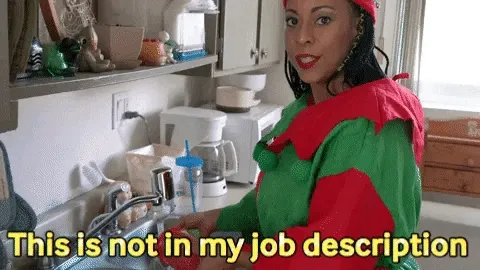Hey, recruiters: Recent grads don’t like your job descriptions
Here’s how recruiters can improve job descriptions to attract young applicants.

Holly Logan via Giphy
• 3 min read
Mikaela Cohen is a reporter for HR Brew covering workplace strategy.
Have you ever not applied to a job because your experience didn’t 100% match what was listed in the description?
You’re not alone: Around one-third of recent grads won’t apply to a job if their major or degree doesn’t match those listed in the job description, and nearly one-fourth won’t apply if they don’t have all of the required skills, according to a recent report from early career platform Handshake and SHRM.
Job descriptions can require too much of applicants, said Laura Mazzullo, founder of recruitment firm East Side Staffing, and recruiters are losing talent because of it. She shared advice for how recruiters can improve job descriptions and attract more early career candidates.
Five skills or less. “There are too many companies listing out every single thing they want,” Mazzullo told HR Brew. Her advice: Highlight the top three to five core skills required to do the job’s function. Any more and the job description will seem like it’s meant for multiple roles.
In addition to those core skills chosen, Mazzullo said recruiters should add three to five “cultural contribution skills,” or what they’re hoping applicants can contribute to the company’s culture.
“Those are just as important as the technical skills. We used to call them soft skills, but we’ve learned they aren’t so soft, they’re actually quite hard to find and equally important,” she said.
No magical unicorn. Issues can also arise, Mazzullo said, when hiring managers ask recruiters to find applicants who’ve done the exact same job they’re hiring for.
Quick-to-read HR news & insights
From recruiting and retention to company culture and the latest in HR tech, HR Brew delivers up-to-date industry news and tips to help HR pros stay nimble in today’s fast-changing business environment.
“They’re looking for that ‘plug and play’...somebody who could just start day one and come in without training,” she said.
Recruiters should encourage hiring managers to stop looking for an exact fit, she said, in favor of someone who can grow in the role. This will also expand their talent pool, which can lead to a more diverse, innovative company.
Let’s say a manager is hiring for a role that’s always required a specific certification, Mazzullo said. Recruiters should ask: Why is it required? What would happen if we hired somebody without it? Is the certification something they can earn later?
See it, say it. Mazzullo said a lot of recruiters don’t have the confidence to critique hiring managers’ job descriptions.
“They don’t know how to tell the hiring manager what’s going wrong, so the hiring manager repeats bad behavior,” Mazzullo said. “Nobody is actually telling the hiring manager, ‘Your job description makes no sense.’”
If you see something that’s not working, let the hiring manager know, Mazzullo said.
“Most hiring managers want to do it right, and they’re desperate to know how,” she said. “As recruiters, it’s our job to come up with creative and customized solutions for hiring managers, but we’re not, and that’s why we’re seeing this [with job descriptions]. It’s an issue of nobody saying anything.”
Quick-to-read HR news & insights
From recruiting and retention to company culture and the latest in HR tech, HR Brew delivers up-to-date industry news and tips to help HR pros stay nimble in today’s fast-changing business environment.